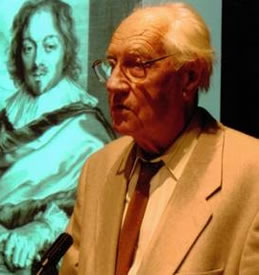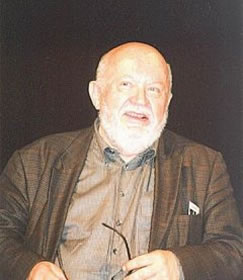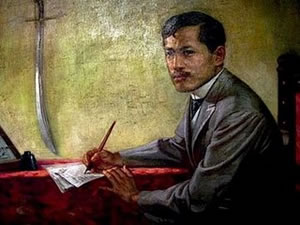De Indisch-Britse schrijver en essayist Salman Rushdie werd geboren in Bombay op 19 juni 1947. Zie ook alle tags voor Salman Rushdie op dit blog.
Uit: The Enchantress of Florence
“In the early morning Mohini the sleepless whore of the Hatyapul brothel awoke her foreign guest. He came awake quickly and twisted her roughly into his arms, conjuring a knife from thin air and holding it against her neck. “Don’t be stupid,” she said. “I could have killed you a hundred times last night, and don’t think I didn’t think about it while you were snoring loud enough to wake the emperor in his palace.” She had offered him two rates, one for a single act, the other, only slightly higher, for the whole night. “Which is better value?” he asked her. “People always say it’s the all-night rate,” she replied gravely, “but most of my visitors are so old or drunk or opium-stupid or incompetent that even doing it once is beyond a lot of them, so the rate for a single will almost certainly save you money.” “I’ll pay you double the all-night rate,” he said, “if you promise to stay beside me all night. It’s a long time since I spent the whole night with a woman, and a woman’s body lying beside me sweetens my dreams.” “You can waste your money if you want, I won’t stop you,” she said cold-heartedly, “but there hasn’t been any sweetness left in me for years.”
She was so thin that her name among the other whores was Skeleton, and those clients who could afford it often hired her together with her antithesis, the obese whore called Mattress, in order to enjoy the two extremes of what the female form had to offer, first the unyielding dominance of bone and then the flesh that engulfed. The Skeleton ate like a wolf, greedily and fast, and the more she ate the fatter Mattress became, until it was suspected that the two whores had made a pact with the Devil, and in Hell it would be Skeleton who was grotesquely overweight for all eternity while Mattress rattled bonily around with the nipples on her flat chest looking like little wooden plugs.”

Salman Rushdie (Bombay, 19 juni 1947)
De Nederlandse dichter en schrijver Sybren Polet (pseudoniem van Sybe Minnema) werd geboren in Kampen op 19 juni 1924. Zie ook mijn blog van 19 juni 2007 en ook mijn blog van 19 juni 2008en ook mijn blog van 19 juni 2009.
Bloeitijd
Nu is de lucht met blauwe denkbeelden overtrokken,
de avond koel als een avond werkelijk is:
licht, koel, hulpvaardig.
Ik strijk je over je haar.
Je haar is veilig: bloemen zijn overal aanwezig.
Je handen zijn overal aanwezig.
In de stoel lees je me als een krant.
Je legt de krant weg: adem
die je inhoudt, uitademt, inhoudt;
vormt. Wèl ben je een glasblazer van geboorte,
jij, wind zo voorzichtig als een morgen. – Hoor,
de wind steekt op, ik sta op, ik ben iets. Een bloem.
Ik groei.
Ik heb een nog uiterst ranke stengel om mee te lopen,
net als de wind. En ik loop,
heel voorzichtig, ik zie
zie je –
zie, ik ben helemaal doorzichtig.
Vrije vlucht, diepe orde
Je ademt de laatste vrije lucht in,
bijna longduizelig,
vrolijke standbeelddanser
die je minutenlang bent.
Ook de pioenrozen
leven zich volmaakt uit in deze lucht
en draaien hun bloemhoofden mee met de zon.
Het drietoninge gezang van de Messiaenvogel.
Ingekleurde bewegende bomen.
Late onzichtbare zomersneeuw.
De herfst drentelt over de landweg,
in zichzelf verzonken.
Iets ademt je in.
En inmiddels ben je drie hartkloppen verder
en weet je weer alles over alles.

Sybren Polet (Kampen, 19 juni 1924)
De Tsjechische schrijver Josef Nesvadba werd geboren op 19 juni 1926 in Praag. Zie ook mijn blog van 19 juni 2009.
Uit: The Half-wit of Xeenemuende
„The first year in school they sent him back home because he was inattentive, forgetful, scatter-brained, and always fighting — he had even thrown an inkwell at his teacher. It was a clear case of oligophrenia and the doctors offered no hope. And yet the wife of Habicht the engineer loved this child of hers above all. She discovered that he had a head for figures, and before the war began she had engaged a governess for him, and elderly lady who took care of him all day. The half-wit’s name was Bruno.
A cousin of mine who was sent to work in Xeenemuende during the war told me all about him. My cousin lodged with a seventy-year old teacher who was to take the place of the strict governess at the Habichts, after she had been killed in a mysterious air-raid on October 4th. Up to then Xeenemuende had never been touched by the Allied bombers. There did not seem to be any important objectives there, either. There was only the underground factory, and nobody knew what was being made there. In the early hours of the morning of October 4th one small light-calibre bomb made a direct hit on the house where Bruno’s governess lived, and killed nobody else but her, because the old lady lived alone. At the local command they swore there hadn’t been an enemy plane within miles. They talked about long-range artillery fire. Why the British long-range artillery at Dover should bother to fire at Bruno’s governess’s house nobody had the faintest idea.“

Josef Nesvadba (19 juni 1926 – 26 april 2005)
De Japanse schrijver Osamu Dazai (eig.Shūji Tsushima) werd geboren op 19 juni 1909 in Tsugaru. Zie ook mijn blog van 19 juni 2009.
Uit: The setting sun (Vertaald door Donald Keene)
„Mother uttered a faint cry. She was eating soup in the dining-room.
I thought perhaps something disagreeable had got into the soup. “A hair?” I asked.
“No.” Mother poured another spoonful of soup into her mouth as if nothing had happened. This
accomplished, she turned her head to one side, directed her gaze at the cherry tree in full bloom
outside the kitchen window and, her head still averted, fluttered another spoonful of soup between her lips. Mother eats in a way so unlike the manner prescribed in women’s magazines that it is no mere figure of speech in her case to use the word “flutter.”
Naoji, my younger brother, once said to me when he had been drinking, “Just because a person has a title doesn’t make him an aristocrat. Some people are great aristocrats who have no other title than the one that nature has bestowed on them, and others like us, who have nothing but titles, are closer to being pariahs than aristocrats. Iwashima, for example (mentioning one of his school friends, a count), doesn’t he strike you as being more vulgar than any pimp you might meet in the streets? That damned fool wore a tuxedo to his cousin’s wedding. Even supposing there was some necessity for him to appear in that outfit, it made me want to puke just to hear the highfalutin’ language the idiot saw fit to use when making a table speech. That kind of affectation is a cheap front which has nothing whatsoever to do with refinement. Just the way there used to be signs around the University saying ‘High-Class Lodgings,’ most of what passes for the aristocracy might actually better be called ‘High-Class Beggars.’ The real aristocrats don’t put on silly airs like that Iwashima. Mama is the only one in our family. She’s the genuine article. There’s something about her none of us can match.”

Osamu Dazai (19 juni 1909 – 13 juni 1948)
De Filippijnse schrijver José Rizal (eig. José Protacio Rizal Mercado y Alonso Realonda) werd geboren op 19 juni 1861. Zie ook mijn blog van 19 juni 2007 en ook mijn blog van 19 juni 2008en ook mijn blog van 19 juni 2009.
Our Mother Tongue
IF truly a people dearly love
The tongue to them by Heaven sent,
They’ll surely yearn for liberty
Like a bird above in the firmament.
BECAUSE by its language one can judge
A town, a barrio, and kingdom;
And like any other created thing
Every human being loves his freedom.
ONE who doesn’t love his native tongue,
Is worse than putrid fish and beast;
AND like a truly precious thing
It therefore deserves to be cherished.
THE Tagalog language’s akin to Latin,
To English, Spanish, angelical tongue;
For God who knows how to look after us
This language He bestowed us upon.
AS others, our language is the same
With alphabet and letters of its own,
It was lost because a storm did destroy
On the lake the bangka in years bygone.

José Rizal (19 juni 1861 – 30 december 1896)
Portret door Fabian Dela Rosa, 1902
Zie voor nog meer schrijvers van de 19e juni ook mijn vorige blog van vandaag.
